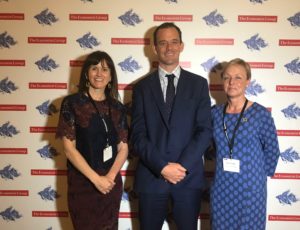Melanie Siggs Speaks at Economist’s World Ocean Summit
 Melanie Siggs, director of strategic engagements for the Global Aquaculture Alliance, was among three speakers participating in a panel discussion on sustainable aquaculture at the World Ocean Summit in Abu Dhabi, UAE, on March 6.
Melanie Siggs, director of strategic engagements for the Global Aquaculture Alliance, was among three speakers participating in a panel discussion on sustainable aquaculture at the World Ocean Summit in Abu Dhabi, UAE, on March 6.
Organized by The Economist, the conference drew hundreds of attendees from various marine-related sectors, and aquaculture is a more prominent part of this year’s program. For the second year in a row, GAA teamed up with The Economist for its World Ocean Summit as a supporting association.
Titled “In Conversation: How Can We Achieve Scale in Sustainable Aquaculture?” the panel discussion focused on the need to grow responsibly as more and more investment flows into the sector.
Siggs laid the groundwork for the conversation by outlining that global seafood production currently sits at about 170 million metric tons, and that an additional 44 million metric tons is needed by 2030 to meet the demand for seafood, the vast majority of which will come from aquaculture. She then praised the aquaculture industry for continually finding solutions to challenges. “We being human beings, when sufficiently incentivized, we are very good at finding answers. As such, we should believe we are at least capable of finding answers and progress to the challenges we face in responsible aquaculture development,” she said.
Siggs emphasizes that people do need incentive to create change. “Humans tend to need incentive to really ramp up their energy … or it happens more ‘gently’ with less urgency. Such incentives may be financial reward or financial survival. It may be brave regulatory changes to accelerate change. It may sadly be hunger, or something else. And where ‘answers’ and solutions are found in the wealthier countries, these solutions can be shared or adapted for others.”
Siggs also pointed to aquaculture’s contribution to the United Nations’ Sustainable Development Goals (SDGs), and how many of the 17 goals are in alignment with aquaculture.
Also participating on the panel were Amy Novogratz, founder and managing partner of Aqua-Spark, a Netherlands-based investment fund, and Will Le Quesne, Middle East program leader for the Centre for Environment, Fisheries and Aquaculture Science. Moderating the discussion was Jan Piotrowski, environment correspondent for The Economist. All three panelists agreed that the Summit audience is critical in creating positive change and sustainable scale in aquaculture.
The World Ocean Summit, which takes place at St. Regis Saadiyat Island Resort, runs through March 7. The theme of this year’s summit, the sixth installment of there event, is “Building bridges.” GAA Marketing Director Devan Meserve is also attending the event.



